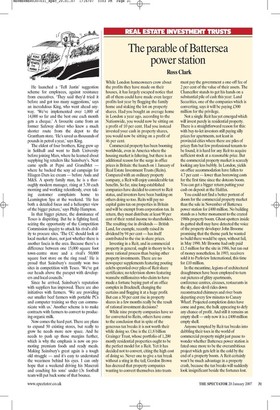The parable of Battersea power station
Ross Clark While London homeowners crow about the profits they have made on their houses, it has largely escaped notice that all of them could have made even larger profits last year by flogging the family home and staking the lot on property shares. Had you bought an average home in London a year ago, according to the Nationwide, you would now be sitting on a profit of 10 per cent. Had you instead invested your cash in property shares, you would now be sitting on a profit of 46 per cent.
Commercial property has been booming worldwide, even in America where the housing market is faltering, but there is an additional reason for the surge in office prices in Britain: the launch on 1 January of Real Estate Investment Trusts (Reits). Compared with an ordinary property company, a Reit will enjoy considerable tax benefits. So far, nine long-established companies have decided to convert to Reit status, and investors have been banking on others doing so too. Reits will pay no capital gains tax on properties in Britain and will be exempt from corporation tax. In return, they must distribute at least 90 per cent of their rental income to shareholders. The resulting rise in dividends — British Land, for example, recently raised its dividend by 94 per cent — has itself contributed to the rise in share prices.
Investing in a Reit, and in commercial property in general, ought in theory to be a more rational process than buying other property investments. There are no newspaper supplements featuring pouting celebs sprawled over piles of Reit share certificates; no television shows featuring wannabe millionaires who claim to have made a fortune buying part of an office complex in Bracknell, changing the curtains and flogging it at a huge profit. But can a 50 per cent rise in property shares in a few months really be the result of rational investment decisions?
While nine property companies have so far converted to Reits, others have come to the conclusion that in spite of the generous tax breaks it is not worth their while doing so. One is the £1.8 billion Grainger Trust, whose portfolio of 1,200 mostly residential properties ought to be the perfect model for a Reit. Yet it has decided not to convert, citing the high cost of doing so. Never one to give a tax break without a sting in the tail, Gordon Brown has decreed that property companies wanting to convert themselves into trusts must pay the government a one-off fee of 2 per cent of the value of their assets. The Chancellor stands to get his hands on a substantial pile of cash this year: Land Securities, one of the companies which is converting, says it will be paying £300 million for the privilege.
Not a single Reit has yet emerged which will invest purely in residential property. There is a straightforward reason for this: with buy-to-let investors still paying silly prices for apartments, not least in provincial cities where there are piles of pricey flats but few professional tenants to be found, it is hard for any Reit to acquire sufficient stock at a reasonable price. But the commercial property market is scarcely looking any less bubbly. In London, yields on office accommodation have fallen to 4.7 per cent — lower than borrowing costs for the first time since the dotcom boom. You can get a bigger return putting your cash on deposit at the Halifax.
You could not find a better portent of doom for the commercial property market than the sale in November of Battersea power station for £400 million. No building stands as a better monument to the crazed 1980s property boom. Ghost-spotters inside its gutted shell may have detected the voice of the property developer John Broome promising that the theme park he wanted to build there would be open, without fail, in May 1990. Mr Broome had only paid £1 5 million for the site in 1986, but ran out of money nonetheless. In 1993, receivers sold it to Parkview International, this time for £10 million.
In the meantime, legions of architectural draughtsmen have been employed to turn out pictures of glitzy apartments, conference centres, circuses, restaurants in the sky, dare-devil rides down reconstructed chimneys and river boats departing every few minutes to Canary Wharf. Projected completion dates have come and gone, the hulk appearing to defy any chance of profit. And still it remains an empty shell — only now it is a £400 million empty shell.
Anyone tempted by Reit tax breaks into dabbling their toes in the world of commercial property might just pause to wonder whether Battersea power station is fated once more to be the overambitious project which gets left in the cold by the end of a property boom. A Reit certainly won't be much advantage in a property crash, because the tax breaks will suddenly look insignificant beside the fortunes lost.





















































 Previous page
Previous page